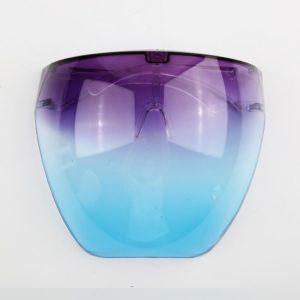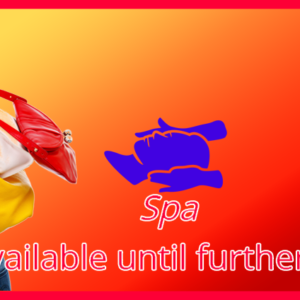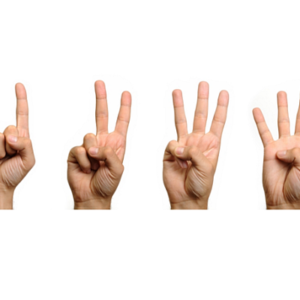Why 1000’s of Global Spa Executives Can’t Sleep at Night Since COVID-19
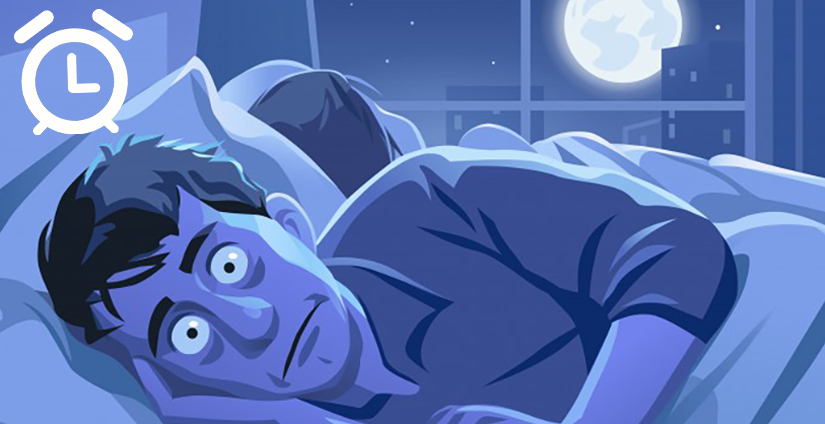
Wouldn’t it be great if things were back to normal in the global spa industry? Instead, wellness travel is terminated for the foreseeable future. Routine facials are finished.
And the deep tissue or relaxing massage is out. In many countries, government mandates require spas to close.
COVID-19 has wreaked havoc across hospitality for the past month,
(NOTE: This is the third post in our 4-part series on “How Coronavirus Should Impact the Way Spas Do Business” and ways CEOs/Spa Managers/Therapists are handling the current crisis. To see the first post in the series click here.)
It’s a familiar story.
Only 11 percent of hotel spas and 14 percent of resort spas give clients the ability to purchase products online. Day spas are leading the pack when it comes to e-commerce sales at 56%. This is more than three times the percentage of hotel and resort spas.
These numbers were crunched before the coronavirus pandemic happened.
News flash… Global Spa Executives Can’t Sleep
How can a spa or resort property expect to increase revenue, grow market share or build relationships when clients are afraid to book an appointment?
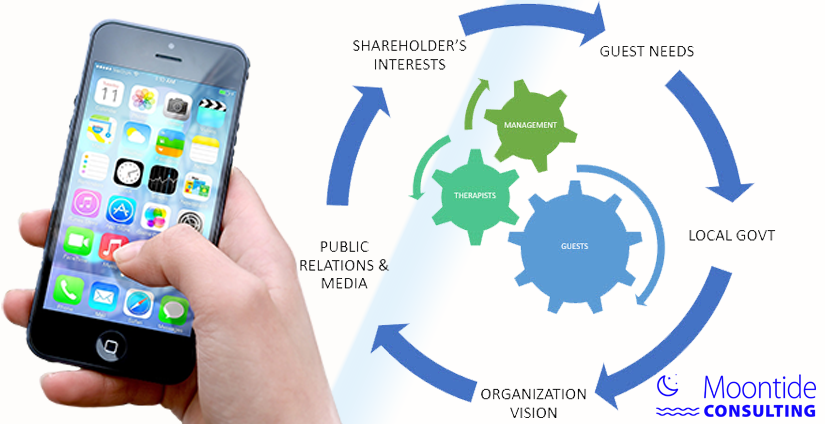
Spa Management, Therapists and Guests are connected to a broader ecosystem
LEADERSHIP CHALLENGE
From fun dances to beauty hacks and makeovers challenges are hugely popular online. Twitter, Instagram and the fast-growing app TikTok are powerful platforms for spreading hits to millions of people worldwide. The latest craze is the #DontRush challenge.
The idea is to go “from bummy to baddie” with a wave of a makeup brush. Just a “poof” and the participant transforms in the comfort of their home. The before and after is instantly shared with anyone watching.
For C-Suite executives, the challenge is to show your leadership skills. Do your actions instill confidence with stakeholders? What is happening to your relationship with spa therapists, customers, and local governments? What message are you sharing with the public?
Let’s dig a little deeper.
In some spas, C-Suite is focused on the current crisis with a mindset of growth and opportunity. A second group is driven by fear. The third set is operating on hope that things will just “return to normal”.
Meanwhile, #WorkFromHome, #StayAtHome, and #FlattenTheCurve are trending all over social media. The decline in the global tourism market alone should command the attention of every C-Suite executive. These are difficult times.
No one can predict with 100% accuracy what direction the health and wellness market will embrace.
There are many multi-billion dollar categories including wellness tourism, the “sleep market”, and CBD and cannabis. Where we can agree is that spa customers and colleagues will have to adjust to a new normal in hospitality on the other side of coronavirus.
The spas that recover from this economic apocalypse will sell products outside of the cushy confines of their physical properties.
It is crucial to pivot to e-commerce, social media and digital marketing.
JOIN THE 10% CLUB
Since only 10 percent of spas are selling beyond their property there is a significant opportunity for senior managers to increase revenues with the right e-commerce strategies.
What if you were able to optimize your online spa and brand presence? No pressure there!
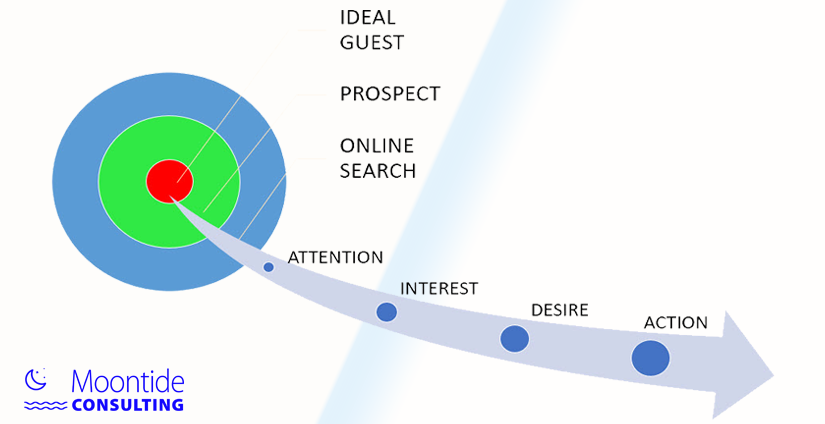
Find your Ideal Guest online with search and move them from Attention to Action with content
I have seen spa C-suite executives bathe in the luxury of not having to pursue the retail sales effort. It contributes less than 2 percent of our overall revenue. Fair enough but why is this allowed to continue? The profit margins on retail product sales exceed that of spa services including massage and facial.
In Part 1 of our series, Linda shared how online retail sales are allowing some spas to continue to retain and pay their staff even during this pandemic. Is it possible to expand the world of spa and wellness while ignoring the e-commerce opportunity? Not likely.
First off does your spa have an online store? If not this should be a centerpiece for your pivot on the other side of the coronavirus. The good news is you can get busy on this now while the hotel business is slow and your spa is closed.
The simple truth is an online store is a 24-hour sales machine that can drive revenue while you sleep. Why not give your clients the ability to log into your site to purchase products, gift cards, services or special promotion packages you create?
CUSTOMERS WANT INFO AT THEIR FINGERTIPS
But now you may be wondering…
How much trend analysis have we done and what content have we created based on the results?
I find often world-class spas do not think of their target audience first in developing a digital strategy.
So here we go. Help people get to know, like and trust your spa even while occupancy rates are down 60% at the hotel. Your role is to identify prospects early in the customer journey and lead them to your website to make a purchase.
For example, if prospective clients search for “best massage in Dubai” or “top facial in Singapore” does your property show on the first page? Before we go any further do some research and determine what skincare, home care or relaxation questions people are asking today.
Gwyneth Paltrow’s Goop does an amazing job with keyword research and it drives the $250 million lifestyle brand. Consider keywords like MDMA have a search volume of 450,000 per month. These topics turn into wellness challenges and some are featured in The Goop Lab on Netflix.
Here’s what we know. People are searching online before buying a product. They may want to know about the ingredients, the safety or the product’s ability to create the desired result. How can you educate them while they are isolated at home?
Now for some secret sauce. What complaints do they have about their current product line or skincare regimen? How can you deliver this information even while your salon is closed?
Create a video series. Offer online consultations. Record answers to Frequently Asked Questions (FAQ section). Engage and bring value that demonstrates your willingness to help.
It all boils down to this. Providing answers allows you to continue to build relationships with your customers and perhaps attract new clients with similar interests.
But first a warning.
Mobile friendly is required. More than 60% of web-search and traffic is happening on the mobile device. Google now indexes “mobile-first”. Many spas boast fabulous looking websites with incredible images and video. But is the site optimized for mobile? Make sure the text is not too small or the images so big that your site is penalized and does not show in the Google search results.
Fact is for resort/hotel, destination and day spas this may be the key to retaining your clients and spa therapists.
Make sure you communicate with your existing clients. This can be done with email, social media or even phone calls. Let them know we’re all in this together. Provide the personal touch that separates your brand and highlights service.
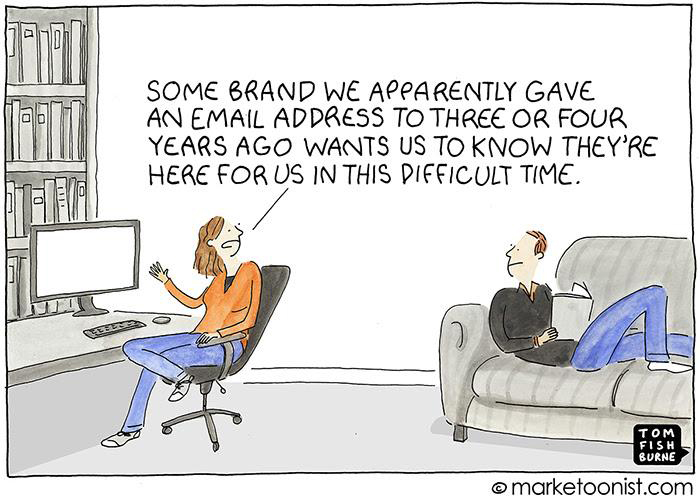
Don’t wait until a crisis happens to communicate with your customers
This is how you go beyond being a trinket seller and commodity-based business that only competes on providing the cheapest price.
NEW COMPETITION IS EMERGING
It’s simple. Spa is all about people. When is your team available to show their expertise on social media by consulting or answering questions? Where does your website integrate with social and e-commerce? How secure is the information?
Now here’s the next step and this is important. The spa environment will never be the same after COVID-19 but this could be a good thing. The key is to survive and thrive in the long run.
If you need some guidance please contact us to book a strategy session and determine if e-commerce can work for your specific situation. Right now is the time to take action.


